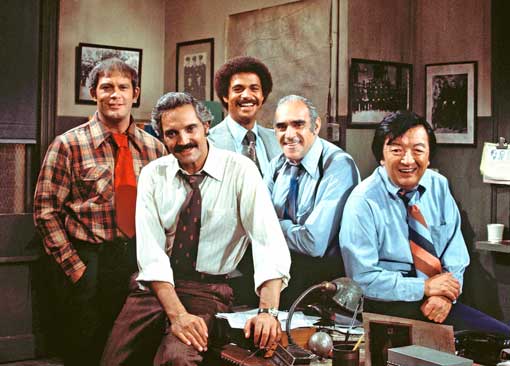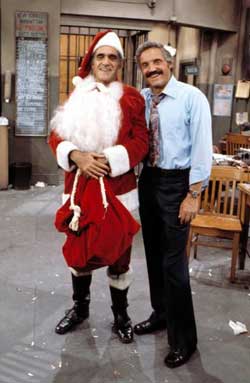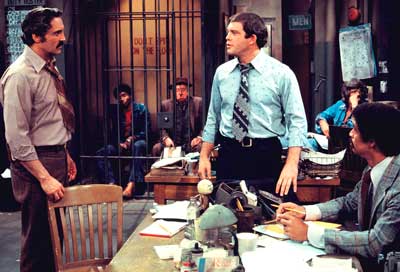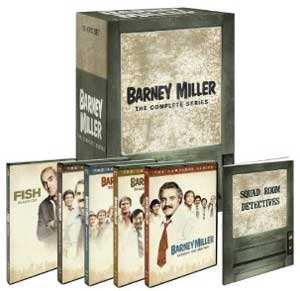
Run, do not walk, to order one of TV's all-time most enduring comedies on DVD, released this week in a bonus-loaded complete series set.
Barney Miller finally gets the treatment it deserves, from our friends at Shout! Factory, who know how to make pop culture milestones come alive. The smart series is owned by Sony (formerly Columbia), which released the first three seasons in sporadic fashion, then seemed to give up the ghost, before this legendary '70s-'80s comedy even really got good.
Shout knew this eight-season classic needed to be released complete, so fans could see how the show evolved, from a workplace/family sitcom centered on Hal Linden's NYPD detective captain, into a police ensemble gem that showcased the continuing parade of kooky citizens coming through the door, just as much as the core assortment of cops trying to deal with them.
It's commonplace now, but when Barney Miller premiered as a midseason series for ABC in early 1975, it had one of TV's first truly diverse ensembles. And it explored that diversity as it arose, without getting heavyhanded. Along with middle-aged Jewish captain Barney -- a level-headed dispenser of what one of the producers' bonus interviews calls "Talmudic justice" -- there were initially excitable Puerto Rican detective Chano (Gregory Sierra), naive but soft-hearted Polish guy Wojo (Max Gail), slow-moving Japanese-American desk man Yemana (Jack Soo), black sophisticate Harris (Ron Glass), and weary almost-retired Fish (Abe Vigoda).

Fish would leave after a couple seasons for a self-titled spinoff sitcom -- the entire first season of which Shout includes in this box! -- along with fellow departure Chano. Arrivals mid-series included laconic intellectual Dietrich (Steve Landesberg), who'd spout about every subject imaginable ("Semantics is my life"), along with overeager and height-challenged uniformed officer Levitt (Ron Carey), plus drop-in Inspector Lugar (James Gregory), forever hanging in Barney's office to babble about the old days.
They had varied perspectives on anything and everything, along with sundry reactions to the perps, victims and locals who came through the squadroom -- which was, for most of Miller's eight seasons, the show's single set. Those visitors were never reluctant to speak their minds, pry or philosophize. They wanted to be heard, as well as delivered of resolution, if not wisdom. And they very often got both from Barney and his men, in ways neither they nor we might have expected.
That teeming sea of humanity represents well the New York City in which Barney Miller took place, specifically around its (fictional) 12th Precinct in lower Manhattan. The show's storylines took advantage of everything the setting then offered, including financial crises, government cutbacks, infrastructure deterioration, and more.
The show could be, but didn't have to be, topical. Wojo was a Vietnam vet who worried over exposure to Agent Orange. Harris was a style maven and nascent yuppie, who'd write, then publish a novel based on his supposed police exploits. Barney and wife Liz separated, then reconciled. There was sexual harassment, gentrification, feminism, gay liberation, vigilanteism, cult religions, anti-nuke activism and more.
But it wasn't necessarily the plots, distinctive as they were, that set Barney Miller apart. (Among other sitcoms of the show's 1975-82 era: Happy Days, Three's Company, M*A*S*H, The Jeffersons.) The people were the thing. The characters. And characters they were, reminiscent of golden-age Hollywood character parts, played in guest shots by actors who sometimes appeared as frequently on the show as the studio contract performers in the vintage flicks that fill Turner Classic Movies. Some viewers might consider their depictions exaggerated, and they do today look a bit larger-than-life -- Barney Miller is theatrical in ways that today's sitcoms simply aren't -- but that amplification of character traits makes them resonate quickly, and deeply, in one-shot appearances often funnier and more moving than they have any right to be.

Speaking of theatrical, the show's episodes were originally shot before a live studio audience, on videotape, in the manner of All in the Family or Roseanne. But series co-creator/auteur Danny Arnold (Bewitched, That Girl, My World and Welcome to It) soon dispensed with the crowd, as recalled in bonus interviews explaining how his perfectionism often meant taping till 2 in the morning. Without the audience, cameras could move in closer, and at angles approximating a four-wall set (rather than the standard three walls). The lighting, too, was more naturalistic and depth-defining -- the kind of realism that would a decade later help underscore the cultural authenticity of Roseanne.
The actors thus didn't have to seek crowd laughs. They could play to the material. And to the crew, whose reactions served as guides to where laughs would later fall when the finished episodes were shown to audiences whose reactions served as the laugh track.
And the jokes! Oh, wait. What jokes? It's all character comedy here, no contrived set-ups or bah-dum-DUM punchline rhythms. Barney can find humor in disaster, and tragedy in the ridiculous, often turning on a dime from laughs to heartache. You could probably read an episode script and never spot anything humorous -- it's all in the personalities, the reactions, the situational absurdity.
Barney Miller changes through its run as those situations do, and its characters evolve through their eight seasons, much more than most. Harris gets more urbane, Wojo more thoughtful, Levitt more confident and accomplished. We're in there with them, feeling their pain as regular Jack Soo dies during Season 5 -- the cast steps out of character to ad-lib a tribute episode -- and as the old One-Two breathes its last in the series' three-part 1982 finale.

DVD bonus features take us through all of it, proving as warm and revealing as a hardcore fan could hope. New reminiscences from surviving cast members Linden, Vigoda and Gail (but strangely not Glass) form the core of a half-hour retrospective. It also includes clips, of course, plus producer-writers Frank Dungan and Jeff Stein, along with archive footage of recently deceased Landesberg. Another half-hour charts the characters' shaping and evolution, with a third featurette on writing for the show.
If you're curious about the show's original unaired pilot, using different actors with Linden and Vigoda, it's here, too, done on film, which reveals a distance from the action that proves the move to videotape was the right idea. (Hey, there's Charlie Haid from Hill Street Blues!) There's also an excerpt from a documentary about Jack Soo, along with producers' commentary on the Barney finale.
Let's not forget those 13 episodes of first-season Fish (1977).
And a wonderful booklet, with an essay and an episode guide -- all tucked into a sturdy box that makes like the door through which all that lively life poured into the detectives' days. (Multiple seasons share space in several standard-width plastic cases that keep the discs safe and easily accessible.)
Hard to believe Barney Miller is three decades old. The characters and concepts wear well, as does the humor, almost never dated. It's adult without being smarmy, intelligent while being welcoming, silly and serious and oh so human, always deliciously different yet warmly familiar.
Could something like Barney Miller be done again today?
If only the TV gods would let us find out . . .
---
Buy Barney Miller here at deep discount ($99 for 25 discs from Amazon.com, as of Oct. 23, from a list price of $160).